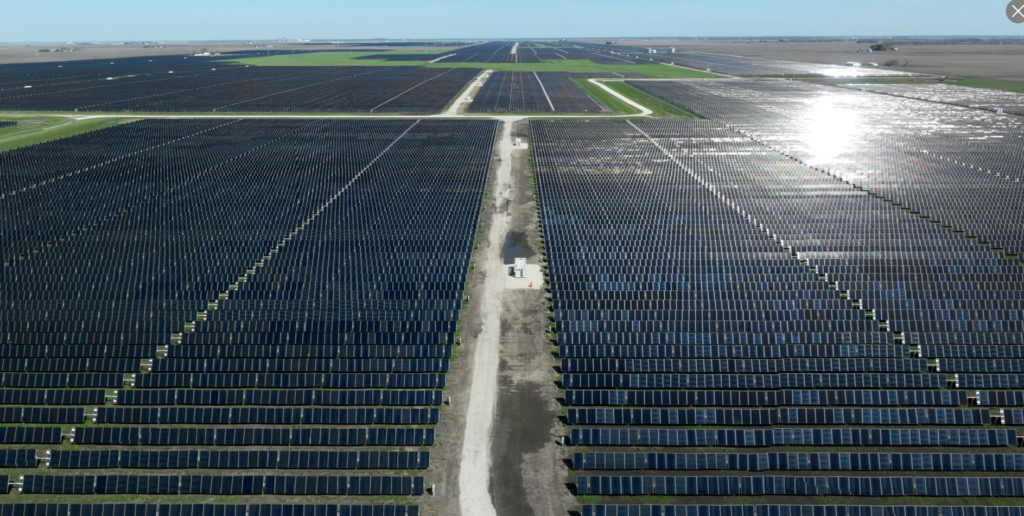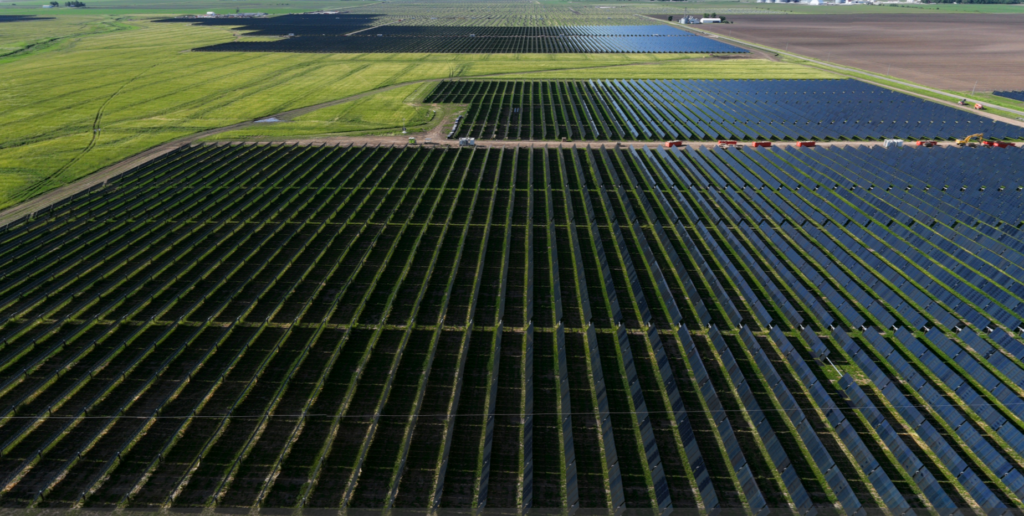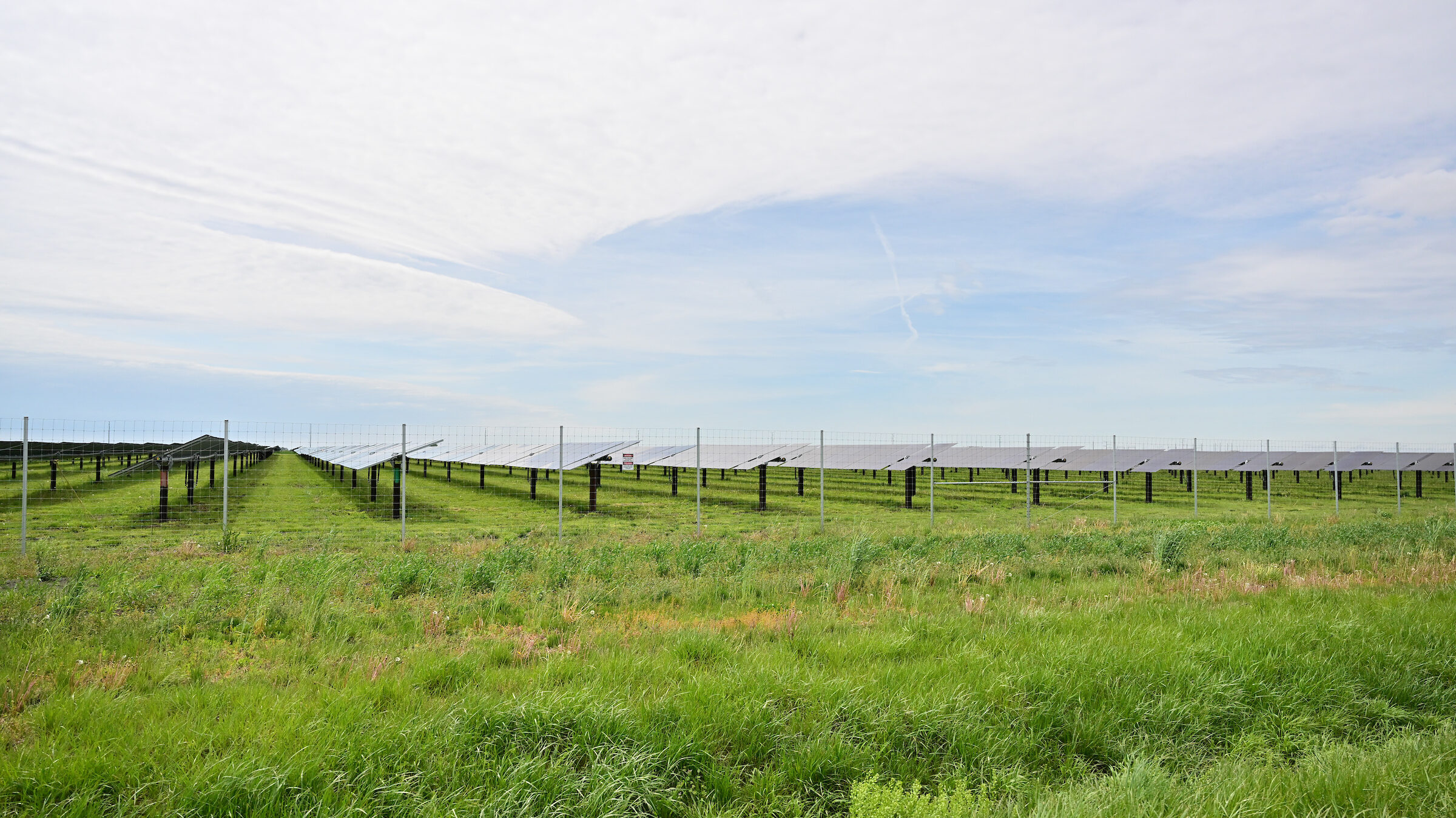Local Government:
Chicago, IllinoisProject:
Retail Contract with 300 MW Solar PPA + RECsCategory:
Off-Site Physical PPAProject Purpose
To power all of Chicago’s municipal operations with 100% renewable energy by 2025, add renewable energy onto the grid by investing in a new project, and deliver tangible benefits to the Chicago community.

Project Overview
In August 2022, the City of Chicago signed a 5-year retail electricity contract with Constellation Energy to power all City-owned buildings, streetlights, and other facilities with reliable, renewable electricity by 2025. This $422 million transaction includes a 300 MW solar power purchase agreement (PPA) through a new solar farm in central Illinois built by Swift Current Energy, which will cover an estimated 70% of their approximately 900,000 MWh of annual electricity consumption. Chicago will offset the rest of its electricity needs with renewable energy credits (RECs) for the near future while also planning to transition away from REC purchases toward on-site and other renewable energy solutions for this portion of its load.
Chicago’s deal is significant for multiple reasons:
- It is the largest municipal deal bringing new renewable energy onto the grid – in fact, the Double Black Diamond Solar project is one of Illinois’ largest solar projects and the largest in MISO to date;
- It is the largest municipal renewable energy deal with a tangible commitment on equity and community benefits;
- The deal is the second largest sleeved PPA deal by any single city in the US;
- The project is leveraging new policies and incentives from Illinois’ Climate and Equitable Jobs Act and the US’ Inflation Reduction Act; and,
- There was a domino effect of Chicago’s deal, with other major public and private energy buyers following Chicago’s lead, including Cook County, Loyola University, CVS, State Farm Insurance, TransUnion, and PPG.
What is the impact of the project?
The benefits of this project are impressive:
- Substantial Emissions Reductions: Chicago’s contract will provide renewable electricity equal to powering over 100,000 homes. This will reduce over a million tons of carbon dioxide (CO2) emissions annually.
- Economic, Labor, and Community Benefits: As a part of its final contract, the City secured $400,000 annually for enhancing Chicago’s clean energy workforce development and community climate infrastructure projects. This funding from Swift Current Energy and Constellation Energy has already supported Elevate, a Chicago-based non-profit, which is helping train female solar installers, some of whom have been able to work directly on the City’s solar project. Beyond the City of Chicago, the project will contribute $100 million in tax revenue for Sangamon County and Morgan County in central Illinois. The solar project supported over 450 construction jobs.
- Lower Energy Cost Volatility: This deal is both a cost-effective and fixed-price investment in clean energy, Illinois jobs, and regional workforce programs that will contribute to a clean energy economy for all Chicagoans. Accordingly, the City can plan its energy-related operating costs – which previously amounted to over $40 million annually given its size – for the lifetime of the contract, regardless of changes and uncertainties in the energy market.
- Supporting Domestic Supply Chains: The solar project brings together multiple American-based businesses, including McCarthy (construction), First Solar (a majority of the 1.6 million solar panels), and Nextracker (solar panel trackers and software) to construct this ambitious project that drives investment in America’s clean energy economy.
“Mayor Lightfoot’s announcement is precisely the type of actions that the American Cities Climate Challenge aimed to deliver… Chicago is now projected to reduce its carbon emissions… all while funding training programs for to help underserved communities thrive in the green economy. Chicago’s push toward renewable energy and community equity is a prime example of U.S. cities continuing to lead the fight against the climate crisis.”
Kelly Shultz, Bloomberg Philanthropies’ Sustainable Cities program

How was the deal structured?
Chicago signed a retail electricity sales agreement (ESA) to source 100% of its electricity from renewable energy by 2025 for its entire municipal electricity load. While the City has used this approach for decades, this ESA will purchase renewable electricity through two parts:
- Power Purchase Agreement (PPA): The ESA includes a 12-year, 300 MW solar PPA between Constellation and the developer Swift Current Energy that will be built in Sangamon County near Springfield, Illinois. Chicago is the “anchor offtaker” (or primary energy buyer) of what is ultimately a 800 MWdc (593 MWac), billion-dollar solar project. Swift Current Energy, the developer, expects it to be online by January 1, 2025.
- Retail Contract + Renewable Energy Certificates (RECs): Constellation Energy will then “sleeve” this PPA into the City’s retail ESA 5-year contract with potential for extension, which will cover approximately 70% of the City’s electricity needs. To offset the remaining gap, Constellation will purchase additional electricity from the grid and renewable energy credits (RECs). These RECs enable the City to legally claim it is buying renewable electricity.
This two-part strategy helps Chicago mitigate financial risks. By signing the PPA, Chicago locks in a fixed price for 12 years to reduce the risk of future electricity price volatility on the city’s operating budget. Additionally, the City manages additional risk by not contracting for all its renewable energy needs from a single project – in other words, not putting all its eggs in one basket.
“We are thrilled to have the City of Chicago as a key customer for the Double Black Diamond Solar project. At 593 megawatts, Double Black Diamond Solar has the capacity to create significant benefits for the State of Illinois. We commend the City of Chicago for their leadership in securing 100% clean, renewable energy for all City buildings and operations and Sangamon and Morgan Counties for hosting this project.”
Matt Birchby, Co-Founder & President, Swift Current Energy
What parts of this innovative approach can other cities learn from?
Chicago’s procurement effort included two ambitious provisions that came to fruition:
- Emphasizing New Renewable Energy Generation: Chicago also wanted to leverage its purchasing power to bring new renewable energy onto the grid. Chicago’s Request for Proposals (RFP) stated that the City desired to purchase at least 50% of its electricity from newly built projects. Chicago’s final deal exceeds that goal with approximately 70% of Chicago’s sizable electricity load consumption now set to come from a new solar project built in central Illinois by 2025.
- PPA Contract Separability: Specifically relevant to municipalities in retail electricity markets, it is worth noting that the deal included flexibility to allow for a separable PPA from the ESA. This provision allows retail electricity providers, like Constellation Energy, to incorporate new-build renewable energy projects, either of their own development or in partnership with other project developers, that are not bound by the 5-year contract term. It also allows Chicago to sign up parts of its energy portfolio for long-term PPAs, like the 12-year solar PPA, but not be tied to a specific retail provider for the full duration of the PPA. This is largely because solar and wind PPAs are typically (and more cost-effectively) financed over a longer period than 5 years. This contract structure enables it to have the flexibility to change ESA providers and spur market competition if deemed to be in the City’s best interest without terminating its 300 MW solar PPA. It is similar to the city leasing a truck and trailer for five years with the option to detach the trailer after the initial contract is up and hook it up to a different vehicle.
Ultimately, Chicago will be one of the largest cities in America to power its municipal operations entirely from renewable energy — a direct result of the City’s ambitious vision, innovative procurement process, and commendable persistence through challenging market conditions. The City strategically used its purchasing power to invest in renewable energy, quality Illinois jobs, and community programs, demonstrating how cities can lead by example and shape an equitable, clean energy economy.
“We are providing a clean energy solution that will help the City of Chicago significantly reduce its carbon footprint and make a tangible, positive impact in the fight against climate change… As we work with our customers to implement sustainability initiatives, it is especially important that we help underserved and under-resourced communities participate in the transition to a carbon free future.”
Jim McHugh, Chief Commercial Officer, Constellation

What advice would Chicago give other local governments as they pursue climate action projects?
Embed Equity Throughout Procurement & Contracting: To help shape a just energy transition, Chicago wanted to leverage its purchasing power to prioritize proposals that included local projects either in Chicago or Northern Illinois, supported local suppliers, leveraged the local workforce, encouraged diversity in developer and supplier leadership teams, and offered other community benefits. One-third of the city’s proposal evaluation score was based on these benefits to the Chicago community—equal in weight to the two other core sections: pricing and project delivery approach. This signaled to the market that equity and community-focused benefits should be a key component of proposals.
As a result, the project achieved the largest community investment fund through a municipal renewable energy procurement. As part of the contract, $400,000 will be invested annually by Swift Current and Constellation into community climate infrastructure and workforce development. Because it will be the anchor tenant for the 593 MW solar farm, Chicago is helping create approximately 450 construction jobs in clean energy by bringing this project to market.
The deal also meets CEJA’s equity and labor goals, including paying prevailing wage and having 10% of the labor force provided by qualifying “equity-eligible persons.” And while the City did hit CEJA targets for non-white employees in the selected developer, the City also learned first-hand how hard it is to shift who is part of the clean energy workforce when there is a limited number of minority-owned contractors – even with the purchasing power of the 3rd largest American city.
Build Project Teams That Leverage Internal and External Strengths: Chicago assembled a project team that included a diverse range of experience and expertise. This included legal, finance, and sustainability staff as well as non-City technical partners with energy procurement and community equity expertise, who served as non-voting advisory members to aid decision-making. The strength of the City’s team also helped it better navigate market and policy challenges (see below) that arose throughout the procurement and contracting process.
“I am incredibly proud to advance this commitment to transitioning all city operations to 100% renewable energy by 2025… The signing of this agreement demonstrates that the City of Chicago is leading by example and driving high-impact climate action, building the clean energy workforce of the future and equitably distributing meaningful benefits to foster the local clean energy economy for all.”
Lori LIghtfoot, Former Chicago Mayor
What were Chicago’s biggest challenges in setting up this project?
A Confluence of Crises: The City completed this deal despite facing local, national, and global stressors. Chicago embarked on its procurement process in early 2020, just as the COVID-19 pandemic arose. In the middle of this effort, Chicago projected a $1.2 billion budgetary deficit – the largest in Chicago’s history. This made finding a cost-effective clean energy deal even more imperative. Finding an affordable deal was further complicated global supply chain issues and market uncertainty between 2020 and 2022. The pandemic challenged existing operations and supply chain expectations all while the US Department of Commerce’s investigation into solar tariffs led to project delays, price increases, and cancelations. The City and its team of dedicated city staff, energy consultants, technical assistance partners through the American Cities Climate Challenge (including RMI and the World Resources Institute), and community stakeholders continued to make progress by developing and releasing an ambitious RFP and persisting through multiple rounds of proposal evaluation and contract negotiation.
An Evolving Policy Landscape: From RFP release to contract signing, multiple state and federal policy changes complicated negotiations but also offered new opportunities:
- White House Transition & Tax Credit Extensions: First, at the end of 2020, Chicago needed to consider leadership changes in the White House and extensions by Congress to the federal Investment Tax Credit and Production Tax Credit. With its proposal evaluation process already underway, the City asked RFP respondents for a pricing update given the market shifts.
- New Landmark State Legislation: As negotiations continued, Illinois passed the Climate and Equitable Jobs Act (CEJA) in September 2021, which dramatically reshaped Illinois’ clean energy economy. This also offered new opportunities. Chicago pushed forward and adapted to the new landscape mid-procurement, including considerations for CEJA-related equity and labor provisions for large renewable energy projects in Illinois. As a result, Chicago was one of the first public entities eligible for the Illinois Power Authority’s new Self-Direct Renewable Portfolio Standard Compliance Program, which offers a rebate to large electric customers in exchange for retiring Renewable Energy Credits (RECs) from their private clean energy contracts. The City plans to use for further city facility retrofits and on-site renewable energy deployment.
- Congress Passes the Inflation Reduction Act: In August 2022, one week after Chicago signed its contract, Congress and President Biden signed the Inflation Reduction Act into law with unprecedented incentives for clean energy. While the Double Black Diamond Solar project was not planned with these incentives in mind, the enhanced Investment Tax Credit coupled with the Domestic Content and Energy Communities bonus adders helped meaningfully soften negative economic pressures on the project due to the pandemic, inflation, and supply chain challenges without having to reevaluate pricing.
How does this project fit into Chicago‘s broader climate and community goals?
From the beginning, Chicago’s leadership team was committed to not just purchasing renewable energy but also facilitating a just energy transition for all Chicago residents and businesses. Chicago advanced city-wide building decarbonization commitments and released a new climate action plan in 2022 to emphasize climate, energy, and equity.
Additional Information and Resources
- Swift Current Energy Secures Investment from Google for 800 MW Solar Project (August 2024)
- Mayor Lightfoot Announces Agreement to Purchase 100% Clean, Renewable Energy Starting in 2025 (August 2022)
- City of Chicago Announces $200 Million RFP For Renewable Energy Supplier for All City-Owned Buildings (City of Chicago Press Release – September 2020)
- Request for Proposals (RFP) for City of Chicago Municipal Electricity Supply, including Renewable Generation (City of Chicago RFP – September 2020)
- Chicago Pursues Ambitious and Innovative Procurement to Meet Renewable Energy Goals (RMI Blog)
- Double Black Diamond Solar Project (Swift Current Energy)
- Chicago Climate Action Plan (City of Chicago plan)
- Mayor Lightfoot Issues Request for Information for City’s Electric Utility Franchise (City of Chicago Press Release – April 2021)
- Mayor Lightfoot Announces Chicago’s Participation in Building Performance Standards Coalition That Will Drive Jobs, and Equitable Climate, Health, and Energy Cost Benefits (City of Chicago Press Release – January 2022)
- Gov. Pritzker Signs Transformative Legislation Establishing Illinois as a National Leader on Climate Action (Illinois Governor Press Release – September 2021)
